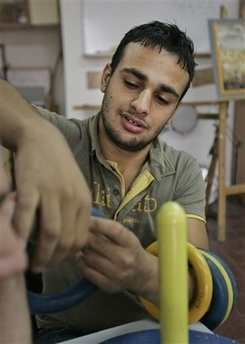Israel wants national service from Arabs
Updated: 2007-11-12 11:01
Haifa, Israel -- The young Israeli is a volunteer working with severely disabled children. He helps them to eat, dress, go to the bathroom. For this, he says, he has been branded a traitor.
|
|
That's because 20-year-old Mohammed Abu Rumi is an Arab, and his work is part of his national service -- an Israeli attempt to incorporate its Arab minority into mainstream society by letting them volunteer in schools and hospitals in lieu of military service from which almost all Israeli Arabs are exempted.
So far, it's not working very well.
Arab leaders are urging youths to reject the program, saying it's window-dressing by a government unwilling to rectify decades of discrimination that have left half of Israel's 1.4 million Arab citizens living in poverty.
Under such pressure, fewer than 300 signed up for national service this year, frustrating government officials.
They take some consolation from the higher number registered for next year: 560. But the low number is still striking, considering that national service entitles them to the same bonuses an army conscript enjoys: discounted mortgages, cash grants, preferential treatment for state jobs, and access to financial aid and dormitories at Israeli universities.
Still, the fact that any Israeli Arabs are volunteering at all, and that their number is rising, worries some Arab leaders.
Last month, in the northern city of Haifa, ordinarily fractious community representatives banded together for a conference against the program.
"It should be a mark of shame," Jamal Zahalka, an Arab member of Israel's parliament, declared to dozens of cheering, whistling youths, many of whom carried Palestinian flags and stickers saying "No to National Service."
Israeli Arabs originally were Palestinians who remained inside Israel's borders after the Jewish state was established in 1948. They and their descendants today are about one-fifth of Israel's 7 million citizens.
Born and raised in Israel, younger Arabs tend to pepper their Arabic with Hebrew and actively participate in Israel's democracy. But for the most part, their ethnic identification is with the Palestinians in the West Bank and Gaza, and they remain a distinct and largely disadvantaged minority.
This is in part because they are exempted from the military, Israel's melting pot. The idea is to spare them divided loyalties, but it denies them veterans' benefits and the lifelong friendships and business connections forged in uniform.
|
|
|
||
|
||
|
|
|
|


